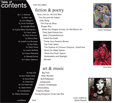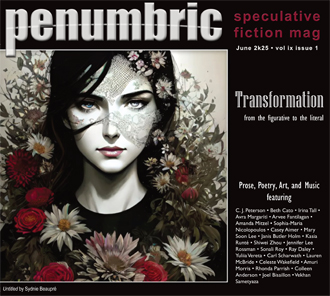From the Editor
by
Jeff Georgeson
previous next


full contents
Now Live On,
No Evil Won
From the Editor
by
Jeff Georgeson
previous

full contents
next

Now Live On,
No Evil Won
From the Editor
by
Jeff Georgeson
previous next


full contents
Now Live On,
No Evil Won
previous

full contents
next

Now Live On,
No Evil Won
From the Editor
by Jeff Georgeson
From the Editor
by Jeff Georgeson
Recently I had a discussion about publishing and AI—but not the discussion you’d expect. We didn’t talk about writers and writing, about AI-authored works. No, this was about those working in the industry, specifically editors and proofreaders, and whether AI could take their jobs as well.
As you may know, for thirty years I’ve been a freelance proofreader for many publishers, reading everything from textbooks by Pearson to celebrity biographies for Hachette. And for most of that time, I only ever thought tangentially about whether AI could do my job; in fact, the general worry was that jobs like mine would be outsourced (which, indeed, in the textbook industry one company I worked for shifted all its project editing operations to India to cut costs and set up a bidding system for work). I have … mixed feelings about outsourcing, as the same thing happened to me in the early 2000s with web and application programming (bidding systems outsourced much of my freelance work to other countries). But the relative shoddiness of the first “grammar checking” tools and the desire of most publishers to print books as perfectly as they could meant I wasn’t worried about automation; in fact, I toyed with creating a grammar and spell checker myself. It seemed a perfect crossover for my skills.
Two things have changed in the last fifteen years or so: one, cost-cutting in the publishing industry has lead to some publishers being a little happier to cut out or reduce some of the steps in getting a book to press, occasionally taking a step out of the editing process (such as having a copyediting stage, but not a thorough proofreading stage) (and I note here that none of those I do work for have done this, but that’s kind of obvious—I wouldn’t have work if they did); and two, advances in automated grammar checkers have aided in some of those cost-cutting measures. So, as my friend postulated, was I worried that AI would take my job?
At this point in time, the answer to that is no. I’ve yet to see a good enough grammar AI, especially for fiction, that it would detect the foibles and rhythms of an author and not go crazy flagging incorrect punctuation and proper nouns and other things. Copyediting and proofreading are both rule-bound and creative; you have to be able to flow with the author’s style (and the type of work) even while you Apply the Rules. But I can see such systems on the horizon. When I did my dissertation on strong AI systems for games fifteen years ago, there was little to suggest anything like ChatGPT or its ilk were on the immediate horizon; big companies were only just beginning to call advanced data analytics “AI,” and most of the public-facing part of that work was still in getting that AI to beat a human player at Go. Chatbots were the most basic of creatures. But the vast data trove created by social media and the ability to analyze it made possible by both advances in computational ability and in AI have hastened (or even created) an intense foray into all the arts, and there’s no reason to believe that something like ChatGPT doesn’t already have the seeds within it to act as an AI copyeditor/proofreader. (In fact, there’s every reason to believe it does.)
So I’m guessing my day job will begin to be obsolete within the next five years, if all goes as it has been going and we haven’t otherwise destroyed civilization as we know it. Will there still be a bespoke set of proofreading jobs still available? Probably. Or conversely maybe some people will be forced to use human proofreaders because they can’t afford the publisher-grade AI proofers.
My initial answer to my friend the other day was, “Yes, AI could do that, but it probably won’t affect me as much because I’ll be thinking of retirement.” But we all know I’m never retiring lol. And I’ll still be puttering around with this wee little magazine you’re currently perusing. But I wonder just what jobs there will be in publishing in the 2030s. The landscape certainly will change.
And on that discomfiting note, I’ll leave more dystopianising for later. (Take that, proofing-bot redlining my new words!)
Jeff Georgeson
Managing Editor
Penumbric











